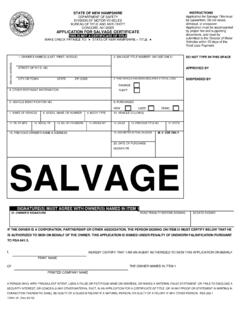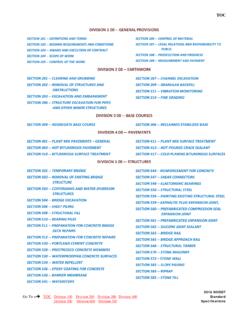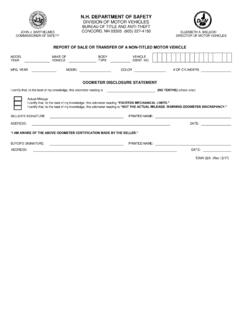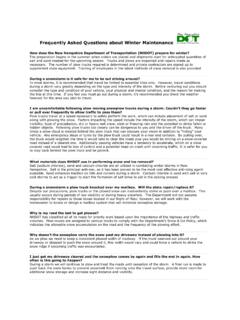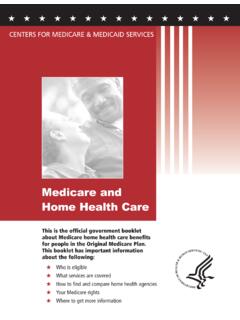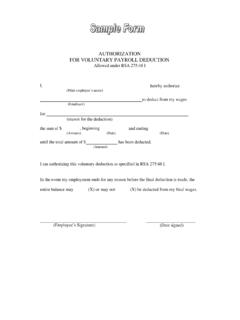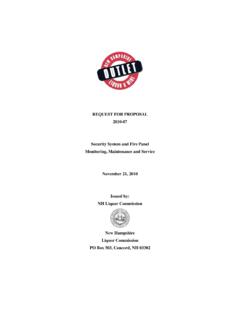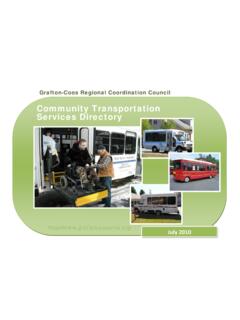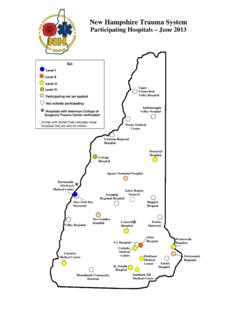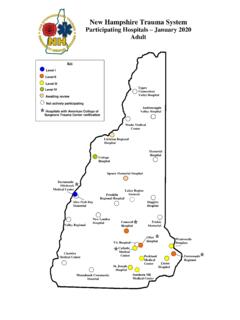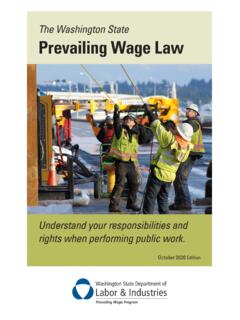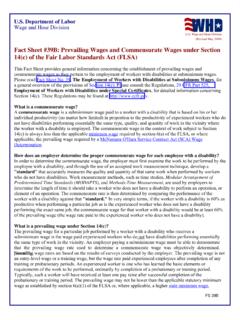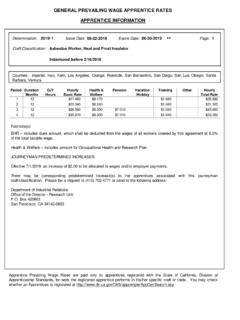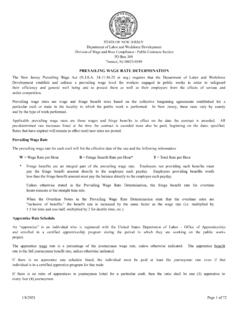Transcription of Davis-Bacon & Related Acts - Questions and Answers
1 2/1/2012 1 Davis-Bacon AND Related ACTS Questions and Answers GENERAL 1) What is the Davis-Bacon Act (DBA)? The Davis-Bacon Act (DBA) was enacted by Congress on March 3, 1931, to assure local workers a fair wage and to provide local contractors a fair opportunity to compete for local federal government contracts. The Act was sponsored by former Secretary of Labor, Sen. James "Puddler Jim" Davis (R-PA) and Representative Robert L. Bacon (R-NY). In general, the DBA, as amended, requires that each contract over $2,000 to which the United states or the District of Columbia is a party for the construction, alteration, and/or repair (including painting or decorating) of public buildings or public works shall contain a clause setting forth the minimum wages to be paid to various classifications of laborers and mechanics employed under the contract.
2 Contractors and subcontractors are required to pay their laborers and mechanics employed directly upon the site of the work no less than the locally prevailing wage and fringe benefit rates for corresponding work on similar projects in the area during the period in question regardless of any contractual relationship which may be alleged to exist. The Department of Labor determines and sets the prevailing wage rates. The geographical scope of the DBA is limited, by its terms, to the 50 states and the District of Columbia. 29 CFR Part 5 The Davis-Bacon Act (WH-1246) 2) What do the terms buildings or works in the Davis-Bacon Act refer to? The terms building or work refer to any construction activity as distinguished from manufacturing, furnishing of materials, or servicing and maintenance work. The terms include, without limitation, buildings, structures, and other facilities on which construction type improvements are performed.
3 Some of the construction type improvements are Related to facilities, such as: bridges, dams, plants, highways, parkways, streets, subways, tunnels, sewers, mains, power lines, pumping stations, heavy generators, railways, airports, terminals, docks, piers, wharves, ways, lighthouses, buoys, jetties, breakwaters, levees, canals, dredging, shoring, rehabilitation and reactivation of plants, scaffolding, drilling, blasting, excavating, clearing, and landscaping. 29 CFR (i) 3) What do the terms construction, prosecution, completion, or repair in the Davis-Bacon Act refer to? The terms construction, prosecution, completion, or repair refer to all types of work done on a particular building or work at the site thereof, including work at a facility which is deemed a part of the site of the work, including without limitation: a) Altering, remodeling, installation (where appropriate) on the site of the building or work on items fabricated off-site; 2/1/2012 2 b) Painting and decorating; c) Manufacturing or furnishing of materials, articles, supplies or equipment on the site of the building or work; and d) Transportation between the site of the work and a facility which is dedicated to the construction of the building or work and deemed part of the site of the work, such as: Project office.
4 Tool yards. Batch plants. Borrow pits, etc. 4) Is the manufacturing or furnishing of materials, articles, supplies or equipment covered under the Davis-Bacon Act? The requirements of the Davis-Bacon Act apply to construction, alteration, and/or repair (including painting or decorating) of public buildings or public works. Only when the manufacturing or furnishing of materials, articles, supplies or equipment is conducted in connection with and at the site of the work called for in the contract, are those activities covered under the Davis-Bacon Act. 29 CFR (i) 5) What is the minimum contract size/threshold for the prevailing wage rate requirements to apply? The minimum contract size/threshold for the prevailing wage rate requirements to apply is over $2,000. 40 3142(a) 29 CFR (a) 6) Does the minimum contract size/threshold for the prevailing wage rate requirements apply to the contractor and/or subcontractors on a project?
5 The minimum contract size/threshold of $2,000 only applies to the prime contractor. All Related subcontractors on the project are covered under the DBA regardless of the size of the subcontract. 7) What are the Davis-Bacon labor standard clauses that must be included in a covered contract? The Davis-Bacon Act requires contracting agencies to insert in full on any covered contract the clauses in the regulations at 29 CFR (a). If a contracting agency has a specific need which requires they modify the clauses, they can do so provided, that such modifications are first approved by the Department of Labor (USDOL). For Federal-aid highway construction projects, the contract clauses required by 29 CFR (a) are included in Form FHWA-1273 which is required to be physically incorporated in every prime contract and all subcontracts.
6 The required contract clauses address the following topics: 2/1/2012 3 a) Minimum wages. b) Withholdings. c) Payrolls and basic records. d) Apprenticeships and trainees. e) Compliance with Copeland Act requirements. f) Subcontracts. g) Contract termination: debarment. h) Compliance with Davis-Bacon and Related Act requirements. i) Disputes concerning labor standards. j) Certification of eligibility. 40 3142(c) 29 CFR (a) APPLICABILITY TO THE FEDERAL-AID HIGHWAY PROJECTS 8) What are the Davis-Bacon Related Acts (DBRA)? The Davis-Bacon Related Acts are those Acts extending the Davis-Bacon Act provisions to Federal agencies that provide assistance for construction through grants, loans, loan guarantees, and insurance. The Federal-aid Highway Acts extended the Davis-Bacon Act provisions to Federal construction contracts in the 50 United states , the District of Columbia, Guam, Puerto Rico, the Virgin Islands or other territories.
7 29 CFR (a) 23 113 9) Are prevailing wage rate requirements applicable to highway construction projects on Federal-aid highways, as defined in the 23 113? The prevailing wage rate requirements apply to any Federal-aid highway construction project (regardless of Federal-aid funding source) over $2,000 that is: a) Located physically within the existing right-of-way of a Federal-aid highway (defined in 23 101 as ".. a highway eligible for assistance under this chapter other than highways classified as local roads or rural minor collectors.), or b) Located outside the physically existing right-of-way of a Federal-aid highway but is linked to or dependent upon a Federal-aid highway project based on proximity or impact ( without the Federal-aid highway the project would not exist). 10) May contracting agencies apply prevailing wage rate requirements to projects not located on a Federal-aid highway?
8 Yes, although not required to do so by FHWA policy, contracting agencies may apply prevailing wage rate requirements to projects not located on a Federal-aid highway. 11) When a contracting agency uses Federal-aid funds for preliminary engineering, is the Related construction project federalized thus making the prevailing wage rate requirements applicable to the construction contract? 2/1/2012 4 NO. The prevailing wage rate requirements apply on a contract basis. A contracting agency may elect to use Federal-aid funds for the preliminary engineering phase of a project and 100% state funds for the construction phase. Since there are no Federal-aid funds in the construction phase contract, the prevailing wage rate requirements do not apply. 12) When a contracting agency ties a Federal-aid funded project to a State or locally-funded project, do the prevailing wage rate requirements apply to all tied projects?
9 Some agencies tie co ntracts for bidding purposes to take advantage of economies of scale, thereby providing an incentive for contractors to provide more competitive bids for all projects. In these cases, the projects are designed, constructed, and administered as separate projects. If the tied projects are treated as separate co ntracts (each contract has its own performance bond, pay items, etc.) and are only tied for the purpose of bidding and award, then the prevailing wage rate requirements only apply to the Federal-aid project. If the tied projects are not treated as separate contracts, then the prevailing wage rate requirements apply to all contracts that are tied to the Federal-aid project. 13) Do the prevailing wage rate requirements apply to force account contracts for emergency repair work performed by the following parties: a) Contracts let by State or local government agencies using force account procedures?
10 YES. The prevailing wage rate requirements apply to work performed by contractors and subcontractors on State or local government-let contracts using force account procedures. b) Work performed by State or local government forces using the force account method? NO. The prevailing wage rate requirements apply to work performed by contractors or subcontractors. State or local government agencies are not considered contractors or subcontractors, therefore the prevailing wage rate requirements do not apply. 29 CFR (h) Memorandum June 26, 2008 (item3) 14) Do the prevailing wage rate requirements apply to contracts for emergency repair work solely for debris removal? NO. prevailing wage rate requirements do not apply to contracts where the scope of work is solely for the removal of debris and Related clean up; however, if the debris removal is performed in conjunction with other repair or reconstruction work, prevailing wage rate requirements apply.
